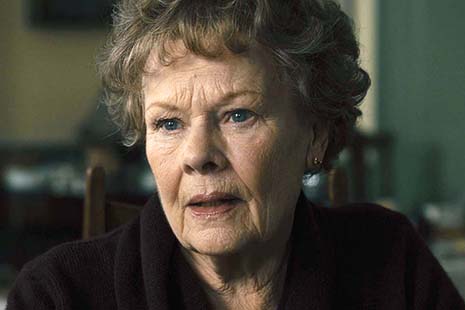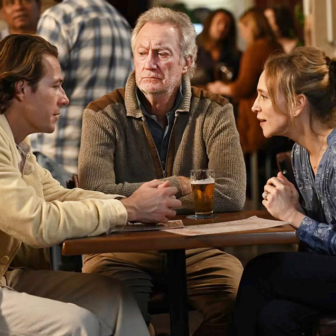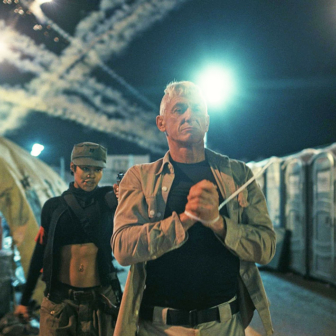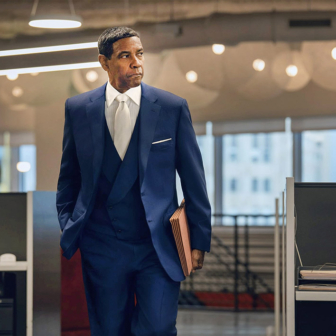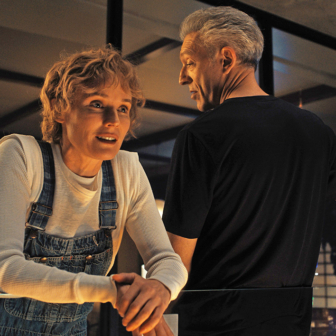THE silly season condemns thousands of us – parents, grandparents and offsiders – to long, long hours of Peter Jackson’s misconceived treatment of Tolkien’s Hobbit, to say nothing of the expenditure on popcorn and fizz. Tolerance was in order for The Lord of the Rings, which in book form was highly inflated to begin with, but The Hobbit deserved sharper focus, truth to the truth of its fiction. The kids get restless, need toilet breaks, and squabble over giant cartons of junk. Their elders take some pleasure in Ian McKellen’s Gandalf, but find Bilbo Baggins rather missing in action between dragon and dwarves in the vast landscapes. Then, looking round for grownup diversions in the cinema, they find limited satisfactions in realist melodrama; both The Railway Man and Philomena announce their sources in real events.
The Railway Man is likely to remain a key text on post-traumatic stress disorder. As Eric Lomax, Colin Firth (he who was born to play Darcy) superbly communicates a pathology of bound-up, reined-in pain and distress, and the irrational ways it can surge into daylight; the tale of true love surmounting its obstacles would be less interesting without Lomax’s outbreak of rage when his new wife, Nicole Kidman’s all-too-sedate and gentle Patti, rearranges the furniture. Behind all that is the burden of memories that can’t be dealt with, the Thai–Burma railway and the Japanese prison camp. The younger Lomax is very convincingly played by Jeremy Irvine, and Stellan Skarsgård gives a fine, gentle version of the companion, Finlay, who can see a cathartic way through psychosis: a meeting with the Japanese torturer (Hiroyuki Sanada), now a guide for tourists visiting wartime sites. The meeting happens, with the patient wife as witness; there is a ritual of apology and forgiveness.
Thus the film is an array of performance around a history, the history told in Lomax’s book, and like the book it censors and rewrites; Lomax’s long first marriage, his first wife and their daughters, have no part in it, despite their share in postwar suffering. So it wasn’t only wartime, but also its later penalties, that the Lomax of this version worked hard to bury; not only the pain suffered, but the pain inflicted as well. Behind and around the narrative a question lurks: taking up the story, why did the director, Jonathan Teplitzky, not question those choices? A larger question presses: when will the film industry cease to call on the second world war as an automatic guarantee of seriousness?
As a history film, Stephen Frears’s Philomena does somewhat better, despite its ramblings. Frears is a fine risk-taking storyteller, here as in The Queen and others. He’s no stylist – the relations of past and present are conveyed in glib and rather clumsy flashbacks; but Judi Dench is stunningly convincing as an elderly woman seeking the son she lost as a teenage mother of the 1950s; she is naive and worldly wise at once, devoutly loyal to the church and yet fully awake to its tyrannies, spouting Mills and Boon storylines to her travelling companion, and quite irritatingly prepared to forgive the unforgiveable. Her child was first institutionalised, then adopted by wealthy Americans. One of the twists in the appalling tale is that the Catholic orphanage actually sold the children of the girls who, in payment for shelter and atonement for their sins, slaved away in its laundries. Another twist comes with Philomena’s late discovery that her son, as an American adult – raised in a solid Republican family, prospering as an adviser in the Reagan administration – had gone back to Ireland in search of her; the Catholic authorities had kept this information from her and denied him any means of contact.
Martin Sixsmith (Steve Coogan), the journalist who is pursuing her story for the popular media, becomes properly enraged by the church’s inveterate cruelty; at some professional cost, he makes Philomena’s purpose his own. He’s dealing with a hard-headed editor (Michelle Fairley) whose focus is determinedly on the sob-story elements. While Dench’s performance has been widely admired, seen as carrying the film, Steve Coogan deserves equal credit for his communication of scepticism and sympathy working together. Philomena is also a film about journalism, one in which the lone-wolf reporter is also an ethical human being. Sixsmith did write his book about Philomena Lee, and it’s not a very good one, being mostly given to a fictional account of the lost son’s career in Reagan’s America; but Dame Judi Dench’s foreword is worth having. She tells us how the real-life Philomena helped her build the part, and thus gives special evidence on how a great screen performance can develop.
American Hustle doesn’t lean on history (“some of this really happened”) but it has a lot of fun with elements of the 1970s, not least those seriously ugly clothes for blokes – you might remember the wide collars and flares. Looking over David O. Russell’s building career as a director, some found Silver Linings Playbook more enjoyable, but this one is more elegant and complex, with a tangling of pursuers and pursued that would regale John le Carré. Russell calls again on Bradley Cooper and Jennifer Lawrence, and gives Robert de Niro less to do as the one really bad man in the balletic ensemble of con-men, con-women and agents of the law. At the centre of the dance Christian Bale, with a lot of extra weight and an unreliable hairpiece, plays Irving Rosenfeld, a grifter of essential goodwill, divided between the airhead seductress Rosalyn (Lawrence) and the stylish trickster Sydney (Amy Adams), a girl who wants to be just about anyone other than who she is. This isn’t farce; it’s high comedy, in a network of traditions where, obviously, you can see how Scorsese laid the ground in Goodfellas. Before Scorsese there was film noir, both American and French; long before all of them there was Restoration comedy, and then it’s back as far as you like to whenever storytellers first understood the endless tangled intimacies between vice and virtue, wives and mistresses, winners and losers, cops and crims.
IN THE continuing, scandalous absence of a properly organised cinémathèque, Sydney still manages its cinematic moments. Many of these are provided by the curatorial work of Robert Herbert at the Art Gallery of New South Wales, where major exhibitions are supplemented by (free) film programs linked to the paintings; thus the current American exhibition has allowed viewings and re-viewings of John Ford’s late and wonderful The Searchers, Clint Eastwood’s high-classical Unforgiven, and Martin Scorsese’s The Age of Innocence, from Edith Wharton’s novel. The last is one of Scorsese’s crowning glories; even those of us with built-in resistance to costume drama will gratefully see it again. Still to come in the series are, among others, Paul Thomas Anderson’s There Will Be Blood, Joan Micklin Silver’s Hester Street, John Ford’s The Grapes of Wrath, Citizen Kane, and Ed Harris’s Pollock. •
